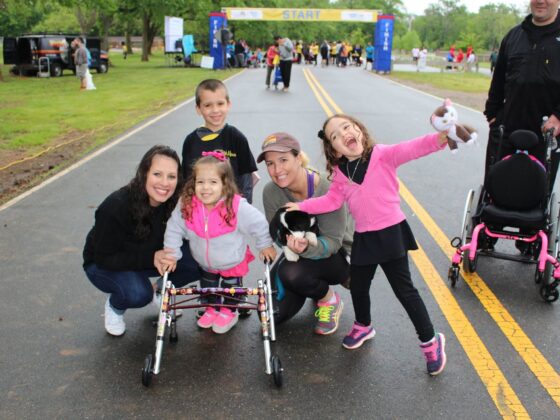As you know, the first few months with a newborn is no joke—the sleepless nights and constant worrying over whether you’re doing everything right have driven many moms (including me) to the brink of insanity. In an attempt to not lose my mind, I tried a Mommy and Me yoga class in Maplewood. After the session, another mom in the class invited me to a café a few doors away to chat and have light refreshments with other new moms. That simple, kind gesture saved my sanity.
I was invited to join their new mom group and we met once a week to talk, snack, share tips, breastfeed, and support each other through those crazy first months. Though I was the only Black mom in the group, I never felt like an outsider. Now, nearly a decade later, I’m still in touch with some of them, and our children have become best friends. Their support is priceless—they have been there for me when I was navigating motherhood and now, as the country reckons with systemic racism and how to move forward as a nation. The sisterhood of motherhood does indeed transcend race but shouldn’t be blind to it. Here are five ways non-POC (people of color) can support Black moms in solidarity against racism:
Reach out to the Black moms you know
Since the widespread protests began, most of the non-POC who have reached out to me have been white mothers. I didn’t think this mattered much until I choked up a few times while hearing their voices angry with frustration or sad with disbelief over what they were witnessing across the country. They were most concerned with how all of it was impacting my family and me. A quick check-in, packed with empathy and an open mind, can make a world of difference. Start by reaching out and asking what you can do to help be a better ally in the fight against systemic racism. Let them know you want to hear their concerns and their Black life matters to you. Be prepared that some may struggle to describe their feelings—there are so many layers to how we are processing and addressing the issue. Protests may not be dominating headlines every day as they were a month ago, but the trauma and effects of systemic racism haven’t gone anywhere.
Support Black-owned businesses
Words are a good start—but actions can make a difference. Numerous studies confirm racial discrimination in every type of business, from lending to real estate to equal pay. Compared to white entrepreneurs, many Black entrepreneurs don’t have the resources to start or sustain a business, especially with COVID weakening the market. Your support of these local businesses isn’t just a way to be an ally—it attracts other patrons and investors to your area and, in turn, supports the families and employees who sustain the business, thus building economic strength in your community. NJMOM has curated a list of fantastic New Jersey Black-owned businesses, so go ahead and do some credit card cardio.
Diversify your kid’s reading
We are our children’s first teachers, and making sure their reading list is diversified will plant the seeds of cultural understanding and social change in the next generation. Head to your local library for age-appropriate books you can read together. Then, be ready to answer their questions and ask them questions to see how they understand what you’ve read. For the younger set, check out the newly released Antiracist Baby by Ibram X. Kendi or Don’t Touch My Hair by Sharee Miller. For older kids, you can go a step further and request that books like Rosa by Nikki Giovanni and Through My Eyes, the autobiography of Ruby Bridges, are added to their schools’ curriculum. You can also seek out a Black-owned bookstore, like The Source of Knowledge Bookstore in Newark. It is just one of two Black-owned bookstores in New Jersey, and nearly the entire right wall of the store has children’s books, and every child who visits can get a free book.
Speak out against racism in your inner circle
While starting uncomfortable conversations with your closest family and friends may be difficult, it’s the most important action you can take. You can lead the way as a voice against racism in places where people of color aren’t represented. Keep in mind the infamous phrase: If you see something, say something. If a remark makes you uncomfortable, imagine it being said to the face of someone you know.
Identify your privileges
You’ve had uncomfortable conversations with your inner circle, but having conversations with yourself is the most challenging. By taking an internal deep dive into your thought processes when it comes to daily dealings with people of color, you can recognize biases, even subtle ones. Then examine your thoughts through the lens of a Black mom to help better appreciate the depth and complexity of your actions. You can also check out resources that help to foster awareness and understanding. In antiracist educator Robin DiAngelo’s book, White Fragility: Why It’s So Hard for White People to Talk About Racism, she explores how being nice is simply not enough. DiAngelo suggests starting with this question: What does it mean to be white? That’s a good starting point to help answer what it means not to be white. If you can understand how emotions such as anger, fear, and guilt reinstate racial inequality, then you can break down barriers to engage in meaningful dialogue. Or watch former NFL player Emmanuel Acho’s “Uncomfortable Conversations with a Black Man” series on YouTube. He answers questions in a safe, judgment-free zone. It’s already garnered more than a million views, and Oprah is publishing a book based on his conversations.
When you’re ready for even more insight, watch the videos of experiments conducted by teacher and diversity trainer Jane Elliott. Brace yourself for some eye-opening exercises, including the famous Blue Eyes, Brown Eyes Exercise. Blue-eyed students were labeled as inferior based only on the color of their eyes and experienced what it felt like to be a minority. Elliott, a white woman, does not hold back in deriding, humiliating and subjugating the minority group. Several had a strong reaction but came to understand how systemic racism works and the effect on some of their classmates.
Now, when you circle back with your Black mom friends and share with them what you’ve uncovered, ask how you can equip yourself to be a better ally. Why is this important? You have an opportunity to carry the narrative of change into spaces in which people of color may not be present. With everyone doing their part, we can create sustainable change together. It may sound like a lot of work, especially amid COVID, but it can happen. Dismantling a system in place for centuries won’t be easy, but, like the warm and welcoming circle of my new mom group, the bonds of mothers can make a huge impact.













